I am a sewer worker in Lahore, Pakistan. I clear sewer system blockages. Every time I enter a sewer I don’t know if I will get out alive. I risk getting cut by blades and broken glass. Getting injured is a normal part of my job. The most frightening thing is the gases that can be released. Some sewer gases can't be assessed from the outside. It’s only when you’re in and move your feet in the sludge that those gases rise up. They can be so toxic that a person can die within seconds.
My name is Shafique Massih and I’m 45 years old. I was born in Lahore. My father was also a sanitation worker, and my mother was a cleaner. When I was five years old my father died. From that day on my life has been difficult.
When I was seven my mother remarried, and I went to live with my paternal uncle. The teacher at the school was very kind to me and supported me financially with my studies until middle school.
I used to think that I would study and would secure a fine job so that I wouldn’t have to work like my parents in people’s houses, but it didn’t work out that way. I began working at the Water and Sanitation Authority (WASA), which is responsible for cleaning the sewers. I was assigned to work at the sewage disposal station.
I got married and had two children. My daughter was born with a hole in her heart. When she was two, the doctors told me she needed an operation which would cost 1 lakh 10 000 rupees (USD 390). It was difficult for me to get that kind of money, so I had to take out a loan.
The day she was operated on was the most difficult day of my life. I will never forget it. During the operation, the hospital ran out of thread for the stitches. They asked me to get more thread, but I had already taken out a loan and didn’t have any more money. The pharmacy wanted 3500 rupees (USD 12.35). I had just purchased a motorbike in instalments for 34 000 rupees (USD 120). In the end I had no choice and had to sell the bike quickly for 8000 rupees (USD 28). Everyone knows how meaningful a daughter’s life is to a father, so I sold the bike, bought the thread and gave it to the hospital. The doctors completed the operation but six months later, my daughter died.
It was a very tough time. My daughter was gone, I had no bike, I was in debt. I had to walk 25km to work every day for the next two years. At the time, the roof of my house was made of mud and it leaked. This continued for many years but I couldn’t fix it. When it rained we’d sit all night on a corner of the bed and pray for it to stop so we could sleep. All our belongings got ruined.
It was a very tough time. My daughter was gone, I had no motorbike, I was in debt. I had to walk 25km to work every day.

After my daughter died, my sister asked me and my son to visit her. I took a 100 rupees loan (USD 0.35) from a friend and rented a bike, got petrol for 80 rupees and kept 20 rupees with me. It was summertime and it was very hot. On the way my son asked for water. I saw a stall selling laddu sweets.
I bought one for my son and they gave him a glass of water. But after finishing his laddu, my son said that he was still hungry and wanted more. I didn’t have the 10 rupees I needed to buy my son another laddu.
That day I felt very helpless that I couldn’t feed my son, and I decided that whatever happened, even if I had to clean sewers or pick up garbage or whatever I had to do, I would never leave my child hungry. After that, I transferred my duties to work in the sewers. The reason being, is that in sewer work, when you are off duty, afterwards you can fix someone's kitchen or bathroom and could earn 100 to 200 rupees. It has been 23 years now that I have worked for WASA, and it has been eight years of working in the sewers.
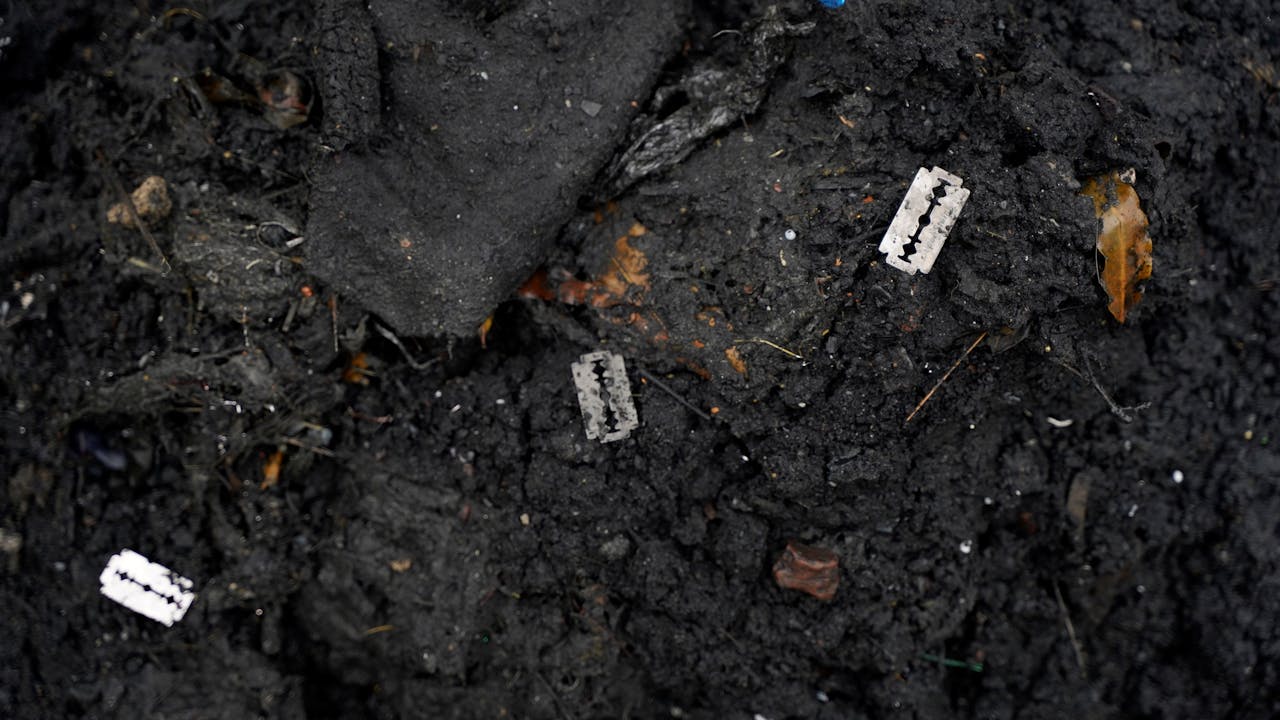
We find broken glass, blades, sharp pieces of wood, and many other things down there. Every time I go into a sewer, I risk getting injured. April 2023.
© ILO/OIT Abu Bakar HussainNo one goes into a sewer willingly. But when your kids are starving, these things do not matter. Children, wife, family, all these things take priority.
It can take seconds for a man to die in a sewer because the gases are so toxic. He won’t even know what has happened to him. Some gases can be checked for by burning a matchstick, another method is to throw sand in, or when we open the lid of a sewer we can see if it is all white or yellow and that shows that there is gas. But there is another kind of gas inside the sludge that can erupt from beneath and kill you.
It's very dangerous work. It can take seconds for a man to die in a sewer because the gases are so toxic.

When we go to clean a sewage line, we knock on the gates of the houses in the neighbourhood whose pipes are connected to the sewer and inform them that our worker is going inside the sewer pipes to clean them, so please do not use water and do not use the toilet. But people do not listen.
For instance, if a person flushes the toilet, it flows directly onto the worker sitting inside the sewer.
Another incident that happened in front of me was when someone was boiling a whole pot of rice. They threw the boiling water down the drain, and it fell all over my co-worker, burning his body.
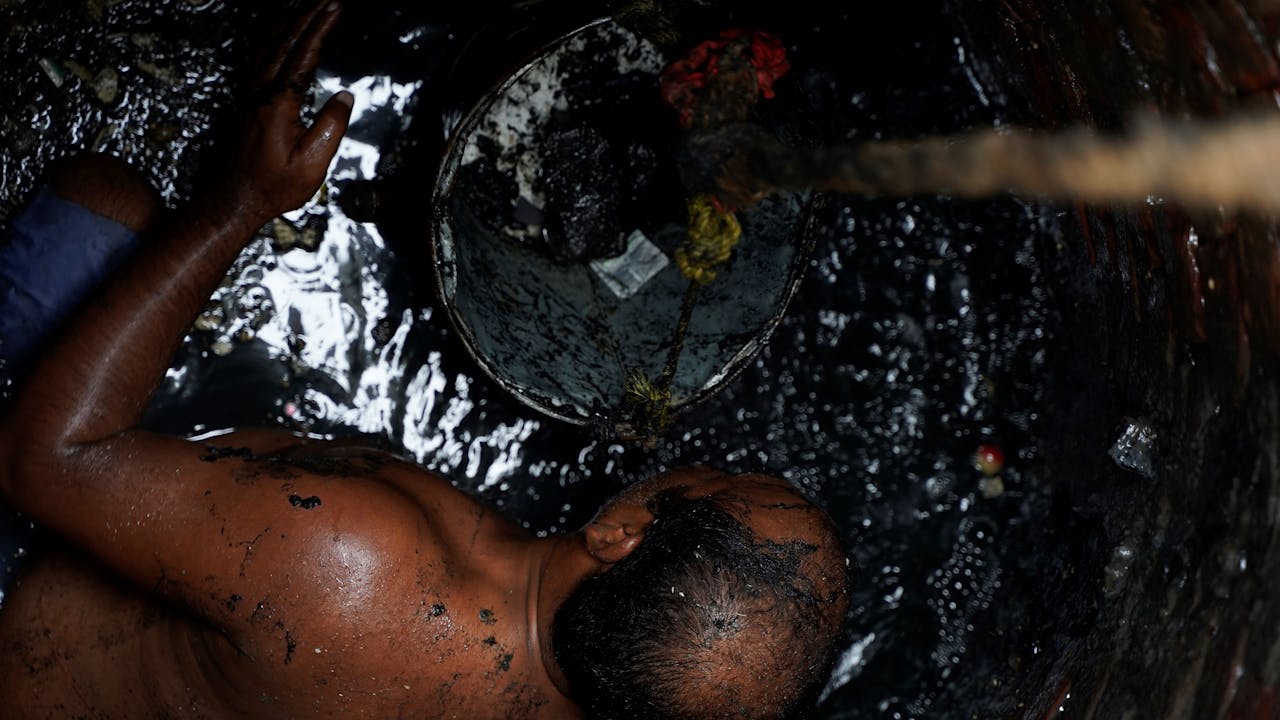
Some sewers can be cleaned within an hour, but others are huge and can take almost two to three days to clean. April 2023.
© ILO/OIT Abu Bakar HussainRegarding safety, our department bought scuba suits from Japan, but there is an enormous difference between Japan's sewage system and ours. The scuba suit is too heavy to wear and work in.
Other than that, we have a safety belt that we wear while going down the sewers so that if a person is attacked by a gas, he can easily be pulled out.
Regarding health, I would say that our eyes, skin and lungs get affected the most. My eyesight is very weak, which worries me. I also have breathing problems and I feel exhausted after only working for a short period of time. I think I will only be able to work for another five, maximum 10 years.
If we get admitted to hospital when we are ill, the department provides support but once we are discharged, we have to pay for medicines ourselves.
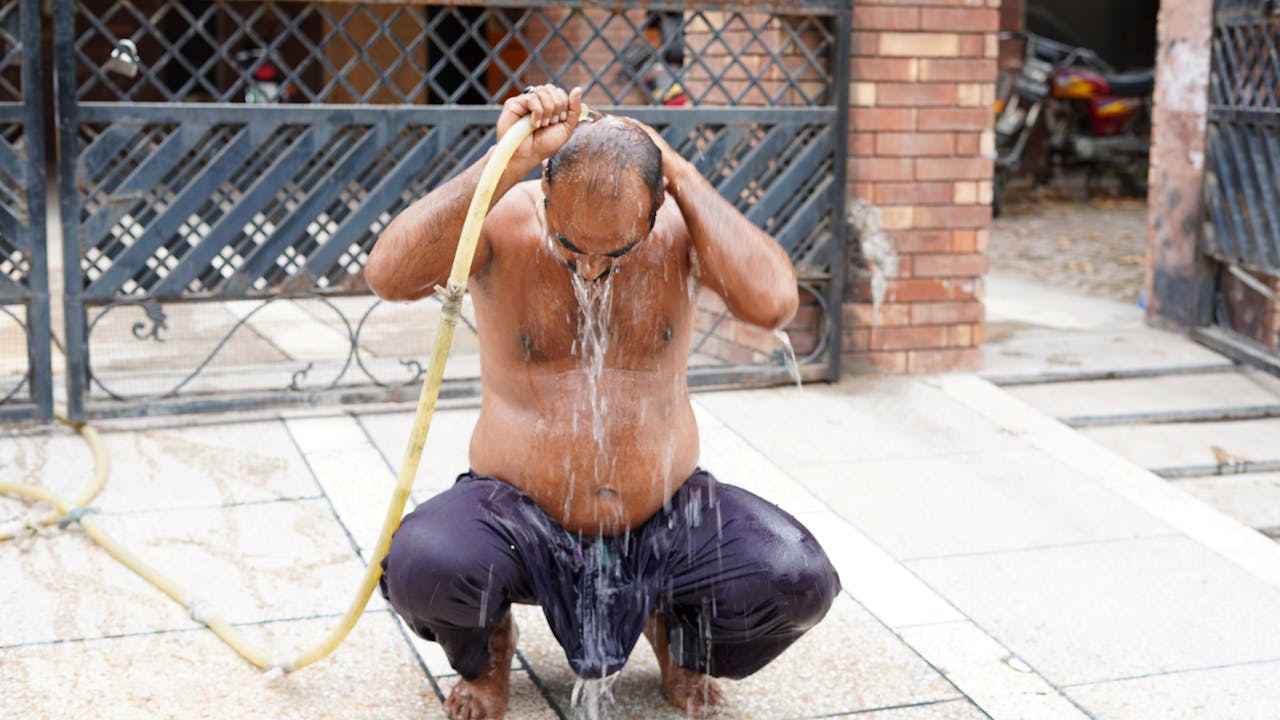
After completing our work in any place, we try to get a water hose from the neighbourhood. Some people are nice, they provide us with soap, or we try to carry one with us. If not, then we go to our centre to take a shower and change our clothes. April 2023.
© ILO/OIT Abu Bakar HussainTwo, three years ago a TV channel came and interviewed me. I gave the interview thinking that I would be able to bring some improvements for workers like me and I would raise my voice for them, but when the interview was broadcast there were negative consequences.
My son had to leave his school. A student saw the interview and told everyone that their classmate’s father cleaned sewers. After this my son was bullied. They wouldn’t sit and eat with him. They threw his lunch into the garbage. When they were playing with him, they threw the ball into the toilet and told him that his father is a sewer cleaner so he also could do that and bring the ball back. My son got angry and got into fights. I went to the teachers and asked them to stop the kids from doing this, but it didn’t work.
Some relatives and people in the neighbourhood looked at us with hatred. One of my friends asked my wife to forbid me from doing this work, that he was respected in the community and that it would affect his reputation if people knew he was friends with a sewer worker.
I got so hurt. A person does everything for his dear ones, and in return, they talk in this way or show hatred that it is heartbreaking. I explained to my wife that I was working hard and not asking anything from anyone, not begging, not taking loans, and earning my own money. Gradually she understood. I also explained to my son so that he wouldn’t hate me.
In general, society looks down on us sewer workers, calling us degrading, humiliating names. They call us choora, bhangi, gutter cleaner. I am not saying that all of them are bad people. There are some good people. There is a lady in Johar town. Whenever we are working outside her house, she gives us cool water or juice if it is summer and gives us tea and biscuits if it is winter, and she gives it on good crockery.
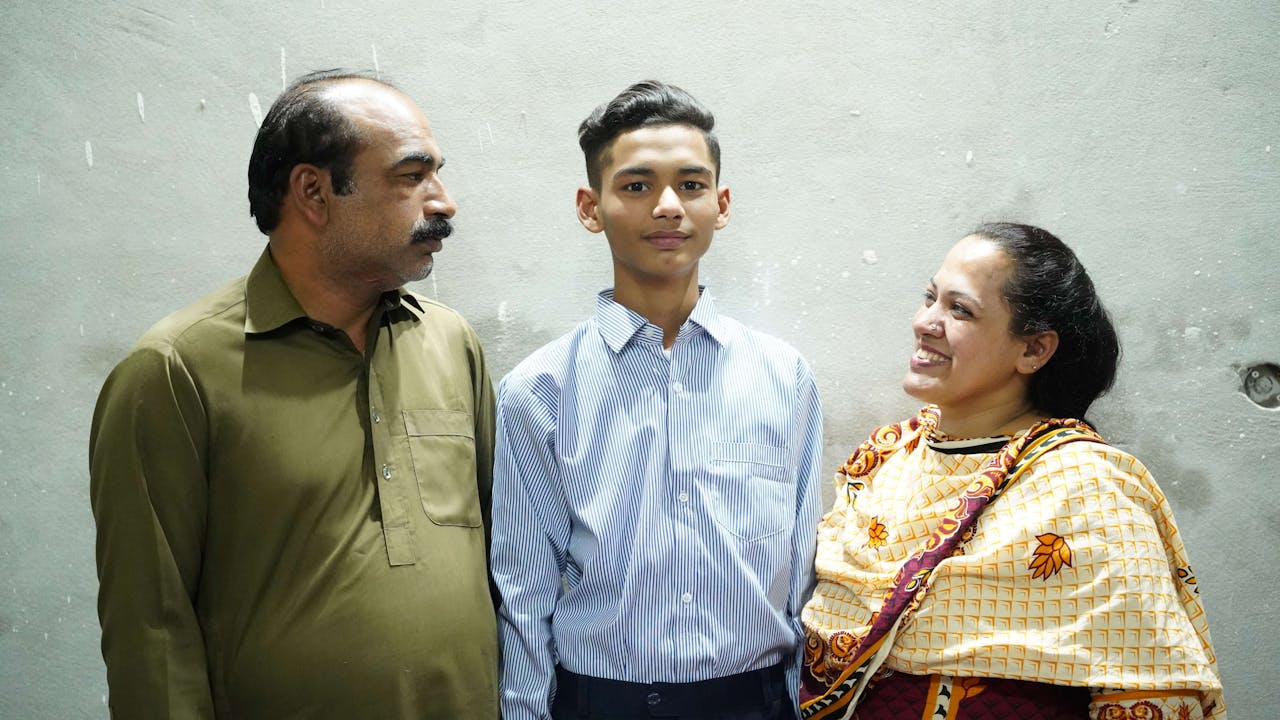
I hope that my son studies well and secures a good job. I also want to be satisfied that the hard work that I did my entire life won't be wasted. April 2023.
© ILO/OIT Abu Bakar HussainIn the future, Pakistan may become a garbage dump, as people are leaving this kind of work because of lack of respect, lack of safety and the salaries are also too low. These things should be made better.
More safety measures should be taken. My life is as important as that of another person. In other countries, sewer workers are provided with proper health checkups every month. We should also have this. Lighter scuba suits should be provided. We also need protective shoes, gloves and masks.
For the last four years I have been trying to raise my voice through different channels to improve the safety and salaries of sewer workers and other sanitation workers. I have reached out to the government and to non-governmental organizations (NGOs). I have also requested that the International Labour Organization (ILO) focus on this. My message to them all is to raise awareness so that people can understand our situation. They should also provide proper training to sewer workers.
No work is bad, it’s human mentality that needs to be changed. If I don't work, someone else will, and he will also be a human being like me. I am making a living through hard, risky and honest work. I am trying my best and I want a better future for my son and our community. I ask people to please respect the cleaners. You people want cleanliness but don’t want the cleaner. Please don’t do this. Give us respect.
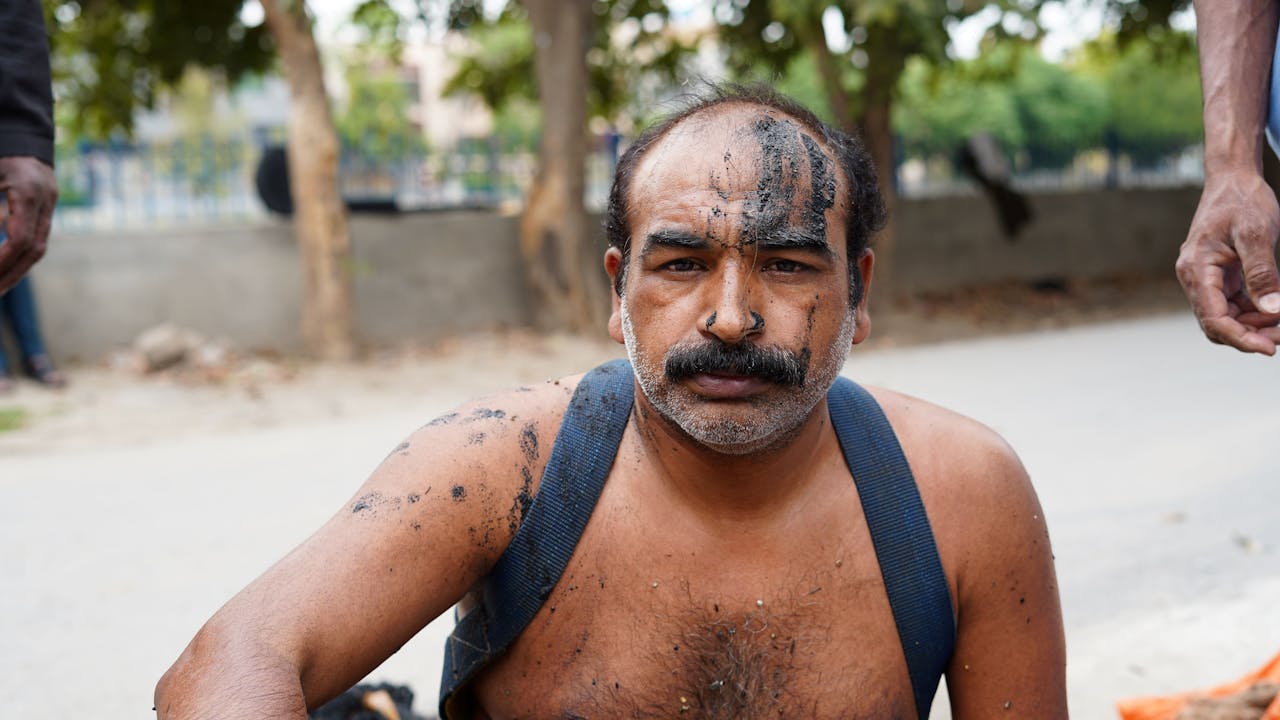
Sanitation workers should be given more respect. We do dangerous, hazardous work so that people can enjoy a clean environment. April 2023.
© ILO/OIT Abu Bakar Hussain